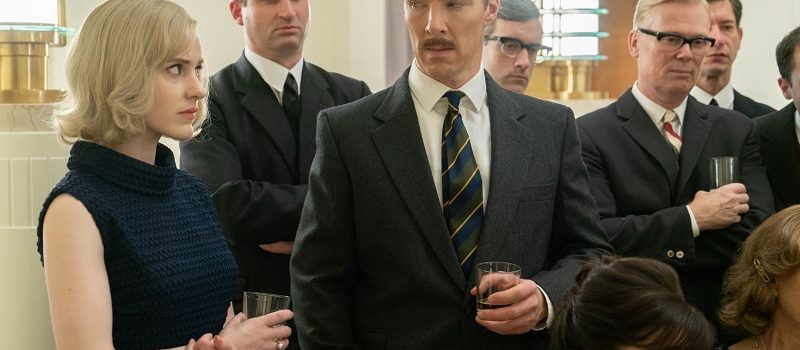The Cuban Missile Crisis is no stranger to being at the center of some thrilling films. Joining that notated group of cinematic stories is a varied bunch. Most recently, it includes the Kevin Costner 13 Days (2000) and the 2019 film The Coldest Game, to name just a few. In The Courier, Benedict Cumberbatch stars Greville Wynne, an international businessman who travels frequently to Eastern Europe. He is targeted by the CIA and MI6 as the perfect person to head to Moscow and befriend someone higher up in the Soviet government under the guise of building business relationships. In fact, it’s all an attempt to get a closer ear to the Russian war machine and to learn exactly what Soviet Premier Nikita Khrushchev (Vladimir Chuprikov) has planned. After all, he did just bang his shoe on the desk at the UN and utter at the United States, “We will bury you.”
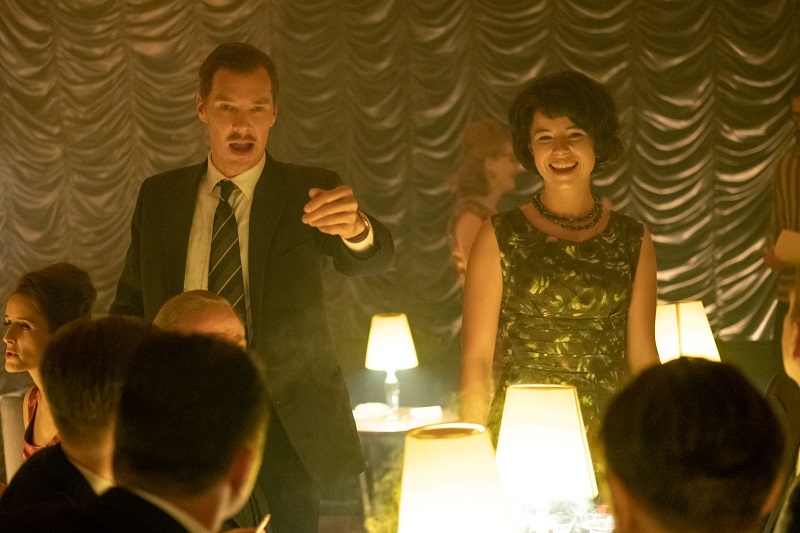
One of those ideas that the Soviet leader has is to place nuclear missiles in Cuba, 90 miles away from Florida and the entire United States. The technology was so different back then, intelligence on the ground in Moscow was more the key to getting a closer view on what it is that Americans are up against so close to their shores. Weather also played a role. It was too cloudy to send a U2 plane. That lucky person in The Courier who gets to go to Moscow in this mission is Cumberbatch’s Wynne. His partner on the U.S.S.R. side in this espionage effort is Oleg Pienkowski (Merab Ninidze).
The two share the most endearing friendship over many months whose message could not be clearer. The de-escalation of two battling nations (cold or hot wars) can start at the smallest level—between two people. This is a powerful message, made all the more impactful by the performances of the two men. Numerous times over history, it has taken the smallest of steps to lessen the chance of conflict. Remember Ping Pong diplomacy?
Cumberbatch is incredible. There are actors who perform a six degrees of separation from themselves with every role they play. In some form, deep down inside, it is an extension of themselves. Which is fine. It’s just that Cumberbatch does something incredible. The moment you see him, your brain thinks, “oh, it’s Benedict.” Then, a millisecond goes by and no matter the role, he is 100-percent that guy. It’s a true gift to us all. There are too few actors who completely lose themselves in a role, such as Daniel Day Lewis. Cumberbatch is one of them.
The way he brings Wynne to life is a masterclass. He is an everyman. He’s got a loving wife, Sheila (Jessie Buckley, Wild Rose). He has a beautiful home and a small boy who thinks the world of him. Above all else, he is a smart and savvy businessman. When approached about the idea of nuclear proliferation (which is what Khrushchev seemed to want), there was no way that this average guy would not accept his government’s call to action for the good of all freedom-loving peoples everywhere. Most importantly, those two loving souls at home. Cumberbatch plays that slight reluctance close to the chest as he enters Moscow and begins this charade with the most innocent of exteriors, which works perfectly to throw off the Soviet government at large.
The other side of this Cold War coin is Ninidze, who inhabits a man conflicted between party and humanity. He knows that Khrushchev wants to “bury” the west and he feels he has the power, and the moral authority, to stop it. In the hands of Ninidze, Penkovsky too plays a family man with a happy wife and small girl. He too has everything to lose if he gets caught. The stakes couldn’t be higher. With Ninidze behind this character, he has humanized the “Russian menace” that we all heard so much about in school, history, and on the news. The Russian actor and Cumberbatch have a yin and yang thing going that develops ever slowly, but firmly, over the course of the film. By its conclusion, these two are utterly authentic as close friends, deeply invested in each other’s lives.
That aspect personalizes a Cold War story. The Courier could have been one we’ve seen 100 times. Instead, this is a thriller based in that nasty period of a frozen battlefield where an arsenal of nuclear weapons was pointed at each enemy—enough to wipe us off the earth. Yet, what is amazing, is The Courier feels like a human interest story where the core of the “interest” is the survival of the modern family, and thus our society as a whole.
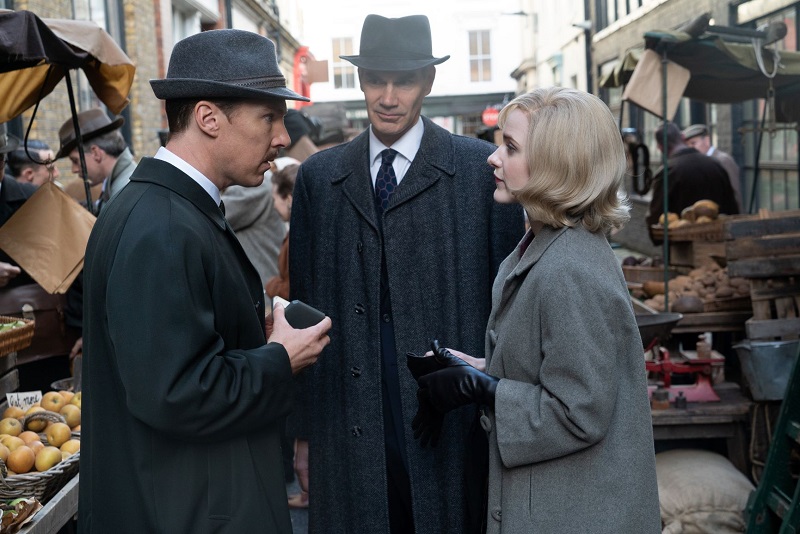
This is one of those movies where we are aware of the ending (a la 13 Days), yet it doesn’t take away one bit from the suspense. After all, the Cuban Missile Crisis was the moment in U.S. history that was the closest having two nations came to full-blown nuclear war. The Courier’s leads, and the ensemble at large, finds director Dominic Cooke utilizing them on many levels. The Courier is a throw-back to the Cold War movies that used to permeate the movie houses in the 50s through the late 80s. But it takes it much further.
What’s fascinating is in this film, how all the while a Cold War was raging, there still were businesspeople conducting their work across the Iron Curtain and in the west. It certainly is a fascinating entry point for a spy thriller. Particularly one that doesn’t involve a trained spy. Cumberbatch’s Wynne is not only a fish out of water in these realms, but the wickedly talented actor manages to craft a character who is ripe for the challenge. There is a universal sense, looking back at history, that between the Greatest Generation who responded to the call of World War II and the generation after it who had to respond to the unique entity that is the Cold War, there are individuals who would do anything for their country, even if it meant spending years in a Russian prison or worse, executed by firing squad.
Rachele Brosnahan, who we recently saw in I’m Your Woman on Amazon and is famous for being The Fabulous Mrs. Maisel, plays her part as a CIA agent to a “T.” She sensitive and projects an innate maternal nature that puts her subjects at ease—all when they are at their most frenzied and nervous. At the same time, she can be as fierce as an angry wasp and one believes if it came to it, she could execute. The actress, obviously, has a knack for comedy, but from what we’ve seen of her of late in the stellar I’m Your Woman and now in The Courier, the future for this stunning actress knows no bounds.
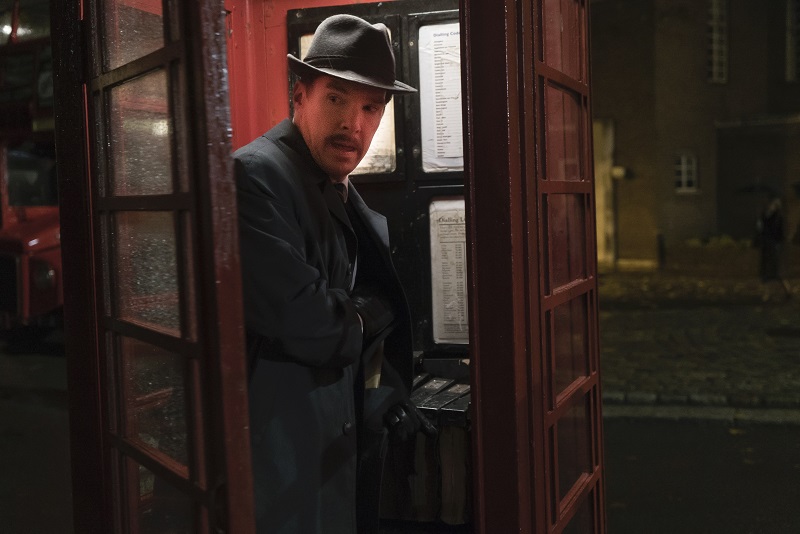
Jessie Buckley, fresh from a star-making turn in Wild Rose, and then following that up with stellar work in I’m Thinking of Ending Things and Judy, is slowly but surely letting the world know that she is a force of nature. She portrays Wynne’s wife and although supporting, is increasingly suspicious of why her husband is making all these trips to Russia. The actress does so much more with the role than the token housewife of the early 60s. She is the glue that is holding this family together and a lighthouse in a sea of darkness for her husband who seems to be lost in an international intrigue that seems to not have any safe conclusions.
This is a slice of U.S. history that is in danger of slipping into the past. Films such as The Courier are a constant reminder that World War II wasn’t the only planet-spanning fight for freedom in recent history. The Cold War was equally as dangerous, perhaps less bloody, but almost more potentially destructive. It ensnares two nations and forced the globe to pick sides. That era is a fascinating one, and it is a true thrill to see it play out onscreen with Cumberbatch and the ensemble behind The Courier.
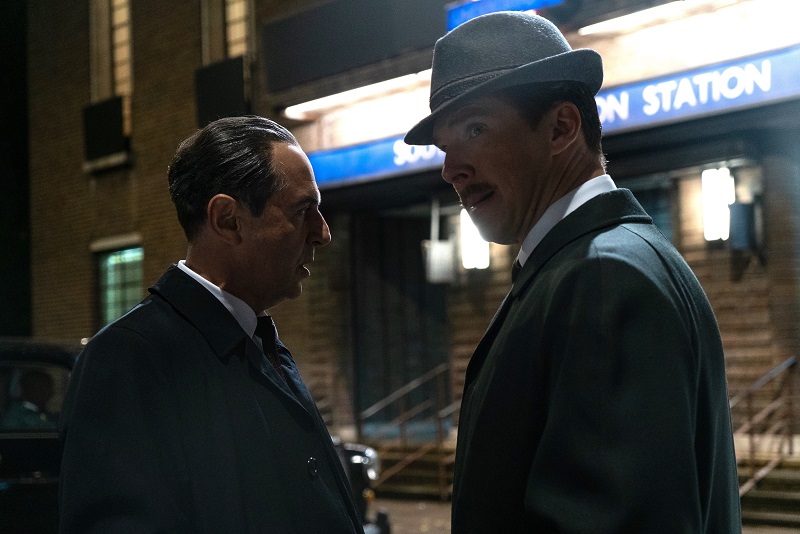
It is an important film. This is a period in American history where the reality of the world completely coming to an end at any second was daily living. That sense permeates every frame of Cooke’s film and the urgency of it all could not be more palpable. What else The Courier does so well is paint a picture that few have seen prior. Every other “war” movie shows our soldiers battling for their sides. But like in Dunkirk, this film illustrates that during a war of any temperature and violence level, it is the average citizens who can turn the tide to victory.
Grade: A

